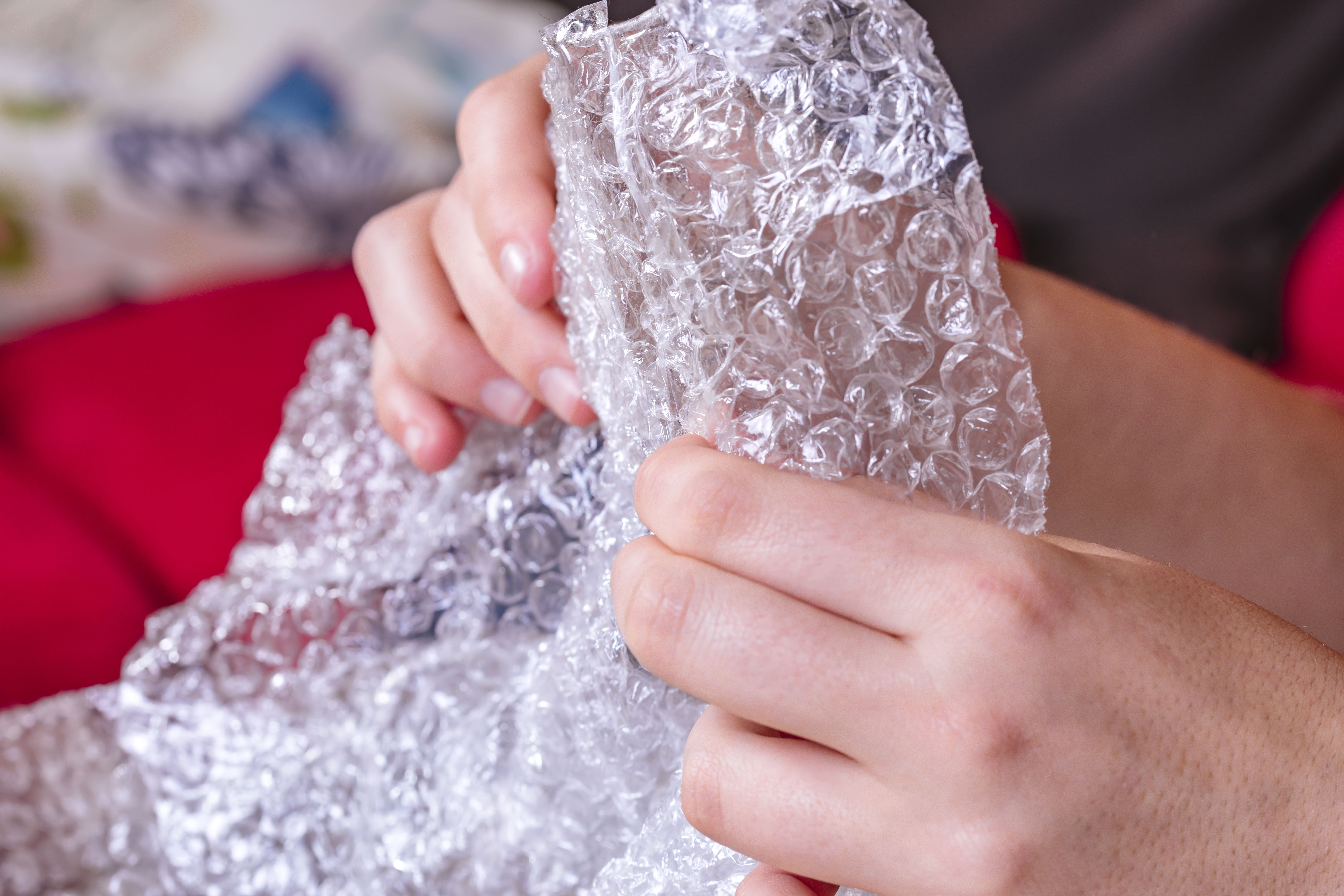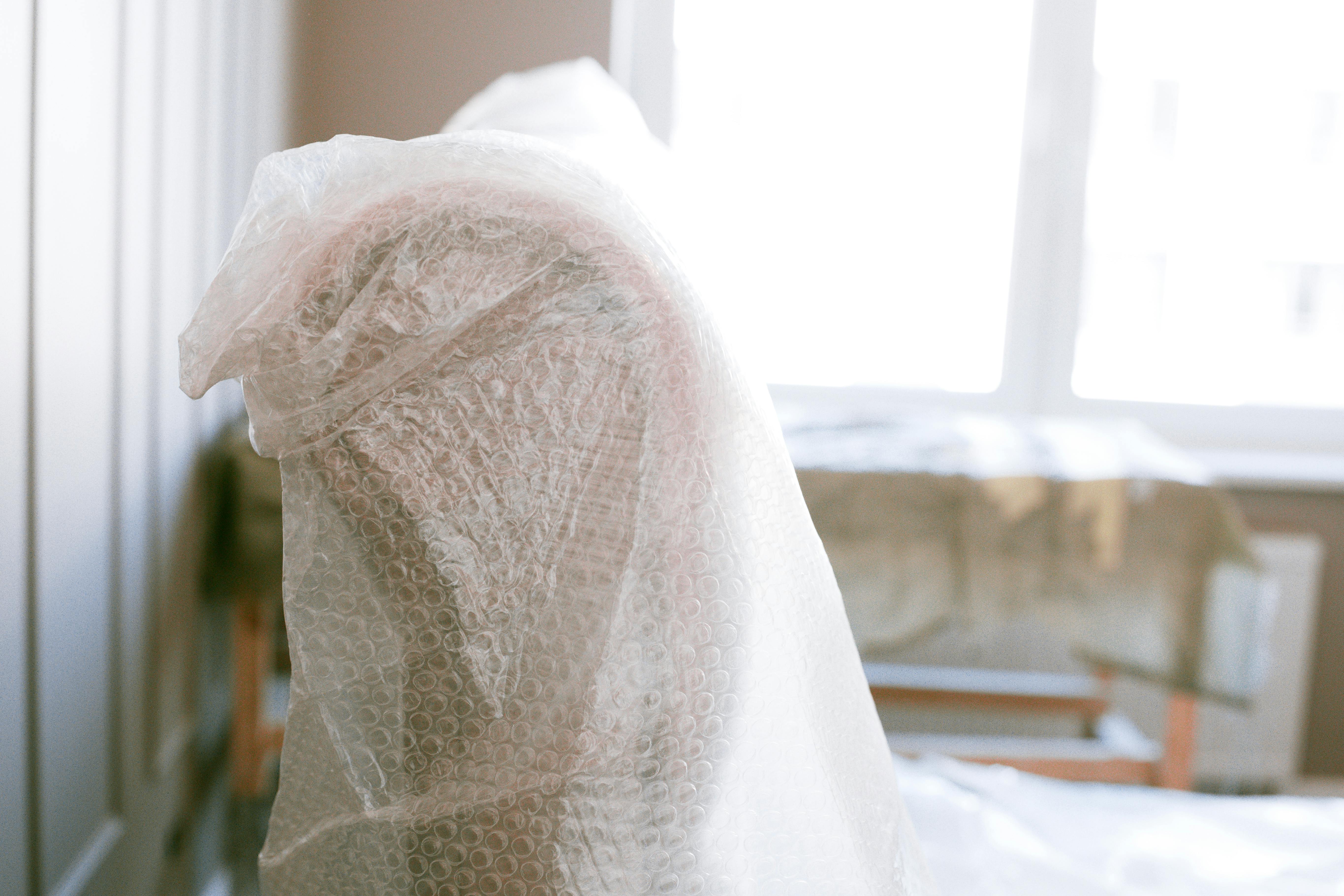All shipping companies use some form of cushioning in their packages. From plastic packing peanuts to plastic styrofoam, plastic pillows and plastic bubble wrap, First Mile has found that nearly half of the UK (44%) feels that companies don’t do enough to minimise their environmental impact.
While solutions can range from hiring sustainable fleets to adopting eco-friendly packaging, one key area of concern is the packaging itself. This brings us to an important question many businesses are asking: is bubble wrap recyclable?
What is Bubble Wrap?

Even though recyclable packaging predates plastics by hundreds of years, non-biodegradable wrapping took the world by storm in the 1900s, and only recently has the push for eco-friendly alternatives begun to make a dent in our waste output.
Plastic bags, cellophane, packing peanuts and polystyrene were all patented in the 20th century, rapidly becoming popular in the shipping and delivery industries. This was the rise of the plastic age, and in 1957, a new (if unintentional) player entered the game: bubble wrap. Originally made from two shower curtains stuck together, the design was patented to be used - surprisingly - as wallpaper.
After this initial sales pitch fell through, creators Alfred Fielding and Marc Chavannes restructured their approach to sell bubble wrap as insulation for greenhouses. Its final use - packaging - was realised as late as 1961, 4 years after it was invented.
Bubble wrap is categorised by two plastic film sheets pressed together with bubbles in between. These air pockets function as a ‘buffer’ to soften bumps and blows suffered in transit. They can also be popped for a pleasing ‘snap!’ sound.
What is Bubble Wrap Made Of?
In recent years, ‘bubble wrap’ has come to be an umbrella term for anything plastic, bubbled and used as packaging. What most people know as bubble wrap, however, is a trademarked product created by Sealed Air - a single company’s production stream that makes it pretty easy to narrow down the details.
Bubble wrap is created using polyethylene film, a plastic dating back as far as 1933. Polyethylene is one of the most widespread plastics in the world, and is used for everything from food packaging to fuel tanks. Because it’s so popular, it’s also become a pioneer of plastic recycling, and many items created with it are 100% recyclable. That’s a pretty big score for landfill reduction efforts!
How is Bubble Wrap Made?
Like most goods, bubble wrap has a complex production line that has been developed and refined over time. Luckily, we have a pretty good insight into what that process is; unlike many companies with a decades-old specialisation, Sealed Air isn’t intent on keeping their factory secrets - excuse our pun - under wraps.
Step 1: Bubble wrap begins as a pile of resin beads, each no bigger than a pea. Called pellets, these beads are created by heating hydrocarbons under incredibly high pressures and running the resulting product - ethylene - through a series of chemical reactions to become ‘polyethylene’.
Step 2: The resin beads are melted down into plastic sheets that carry the desired properties - lightweight flexibility and strength. The precise thickness of the sheets is carefully calculated to ensure that the wrap functions correctly.
Step 3: The thin polyethylene film is placed onto a roller covered in bubble wrap-sized holes. These holes create a vacuum and pull the plastic out into ‘bubbles’. A second film is then sealed to the ‘bubbled’ sheet to trap the air inside, creating the iconic bubble wrap texture.
What Category of Waste is Bubble Wrap?
Bubble wrap is classified as plastic waste, which is inherently non-hazardous as long as it hasn’t been contaminated. Contamination includes contact with hazardous waste such as paint and other chemicals: while polyethylene is sustainable, these interactions may render your plastics non-recyclable.
Can You Recycle Bubble Wrap?
The core question remains: can I recycle bubble wrap? The good news is that the answer is yes! Bubble wrap can be recycled using First Mile's Flexible Plastics Recycling stream, just like many other polyethylene products.
The preconception that bubble wrap is unrecyclable is rooted in council rules about household waste, which disallow polyethylene from being added to recycling bins for collection.
What Bin Does Bubble Wrap Go In?
You can’t add bubble wrap to your recycling bin at home. That doesn’t mean that it isn’t recyclable, just that the council isn’t able to process it through home collection.
As a business, you’re already required to arrange your own waste management solutions - that means that you’re in the perfect position to recycle your bubble wrap with just a few tweaks of your waste arrangements.
Can You Recycle Bubble Wrap at Supermarkets?
Bubble wrap can be taken to any supermarket offering a plastic recycling scheme. That said, it’s not in good faith to take company waste to resources meant for residents. As a business, it’s always better to use your waste management company to make sustainable adjustments.
Can You Take Bubble Wrap to the Tip?
Any tip will be happy to recycle bubble wrap produced by households. The tip does not accept trade or business waste, however, and your company won’t be allowed to drop off bubble wrap at a household recycling centre.
All businesses are required to arrange their own waste management solutions, and misusing a tip could result in fines or a court case.
Is Bubble Wrap a Sustainable Choice?

Yes, bubble wrap can be a very sustainable choice, especially when delicate items need cushioning. As long as the bubbles aren’t popped - yes, we know it’s tempting - it can even be reused, especially if your company operates a drive to retrieve it from your customers.
Bubble wrap can be recycled into a range of new items that use polyethylene - it can even be recycled multiple times! The most important step is to make sure that it gets recaptured into the recycling process: that’s where your waste management company comes in!
You can ensure that your practices are sustainable by hiring a waste management company with a focus on recycling. No matter how much waste your business produces, proper waste management is a fantastic mitigation tool to keep your rubbish from winding up in landfill.


